PEP小学英语六年级
人教版(PEP)小学英语六年级上册知识点归纳

人教版(PEP)小学英语六年级上册知识点归纳Unit 1: How Can I Get There?In this unit。
we will learn some XXX.1.Key Words:Museum: a place where you can see art。
historical objects。
and other XXX.Bookstore: a shop where you can buy books.Cinema: a place where you can watch movies.XXX: to change n.Hospital: a place where people go to get medical treatment.Left: the opposite of right.Post office: a place where you can send letters and packages.Science: the study of the natural world.Right: the opposite of left.Straight: without XXX.Crossing: a place where two or XXX.eful Phrases:Post office: "Where is the post office?"Science museum: "Where is the science museum?"Pet hospital: "Where is the pet hospital?"XXX: "Where is XXX?"XXX: "Where is Beihai Park?"Palace Museum: "Where is the Palace Museum?"Go straight: "Go straight and you will see the bookstore on your left."Turn right/left: "Turn right at the crossing and you will see the hospital on your right."Next to: "The cinema is next to the bookstore."In front of: "The school is in front of the park."Near the park: "XXX is near the park."XXX: "XXX."mon ns:Excuse me: "Excuse me。
新pep小学英语六年级上册教案5篇

新pep小学英语六年级上册教案5篇新pep小学英语六年级上册教案5篇教案中对每个课题或每个课时的教学内容,教学步骤的安排,教学方法的选择,板书设计,教具或现代化教学手段的应用,下面小编给大家带来关于新pep 小学英语六年级上册教案,方便大家学习新pep小学英语六年级上册教案1教学目标知识目标:能够进行物品归属的问话与答语,并能根据物体的远近,正确使用this和that。
能力目标:能听懂,会说要求的单词和句子情感价值:进一步提高对英语学习的热情,培养更加稳定的学习兴趣。
能积极主动地参与课堂活动,在情景对话中大胆开口,主动模仿。
教学重点学习和练习正确书写四会单词和四会句子.教学难点正确使用代词this和that。
课时数 2教学过程 1.热身 / 复习(Warming-up / Revision)1)播放课本附录中的歌曲I want to be your friend, 渲染课堂气氛。
2)把小动物面具挂在墙上,让学生说出它们是什么动词,是谁的。
2.新课导入(Presentation)1)展示本课教学挂图,让学生观察,并提出问题:What are Peter and Lisa doing?What are they talking about?2)播放本课录音,让学生听,然后讨论自己的猜测是否正确。
3)再放录音,让学生仔细听:谁扮演bear?谁的头饰找不到了?最后找到了吗?4)指导学生跟读录音。
5)让学生四人一组分角色表演会话。
6)鼓励学生戴面具到讲台上来表演。
3.趣味操练(Practice)1)教师将全班划分成6~8个小组,每组发一张白纸,每张白纸的最上面都写有“失物招领处”。
要求每组画出3~4种物品,供其它组认领。
2)每组分成两部分,一部分当失主去其它组找丢失物品,另一部分留在本组提供物品。
用所学句型进行交际活动。
3)播放本课投影片,让学生边看边配音。
4. 拓展活动(Additional activities)1)回家听本课录音,模仿语音语调。
(PEP)小学六年级英语上册知识汇总
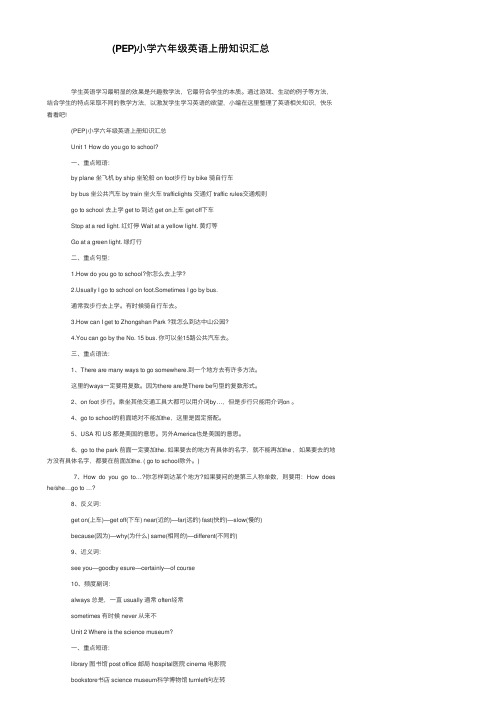
(PEP)⼩学六年级英语上册知识汇总 学⽣英语学习最明显的效果是兴趣教学法,它最符合学⽣的本质。
通过游戏、⽣动的例⼦等⽅法,结合学⽣的特点采取不同的教学⽅法,以激发学⽣学习英语的欲望,⼩编在这⾥整理了英语相关知识,快乐看看吧! (PEP)⼩学六年级英语上册知识汇总 Unit 1 How do you go to school? ⼀、重点短语: by plane 坐飞机 by ship 坐轮船 on foot步⾏ by bike 骑⾃⾏车 by bus 坐公共汽车 by train 坐⽕车 trafficlights 交通灯 traffic rules交通规则 go to school 去上学 get to 到达 get on上车 get off下车 Stop at a red light. 红灯停 Wait at a yellow light. 黄灯等 Go at a green light. 绿灯⾏ ⼆、重点句型: 1.How do you go to school?你怎么去上学? ually I go to school on foot.Sometimes I go by bus. 通常我步⾏去上学。
有时候骑⾃⾏车去。
3.How can I get to Zhongshan Park ?我怎么到达中⼭公园? 4.You can go by the No. 15 bus. 你可以坐15路公共汽车去。
三、重点语法: 1、There are many ways to go somewhere.到⼀个地⽅去有许多⽅法。
这⾥的ways⼀定要⽤复数。
因为there are是There be句型的复数形式。
2、on foot 步⾏。
乘坐其他交通⼯具⼤都可以⽤介词by…,但是步⾏只能⽤介词on 。
4、go to school的前⾯绝对不能加the,这⾥是固定搭配。
5、USA 和 US 都是美国的意思。
PEP人教版小学六年级英语上册知识点
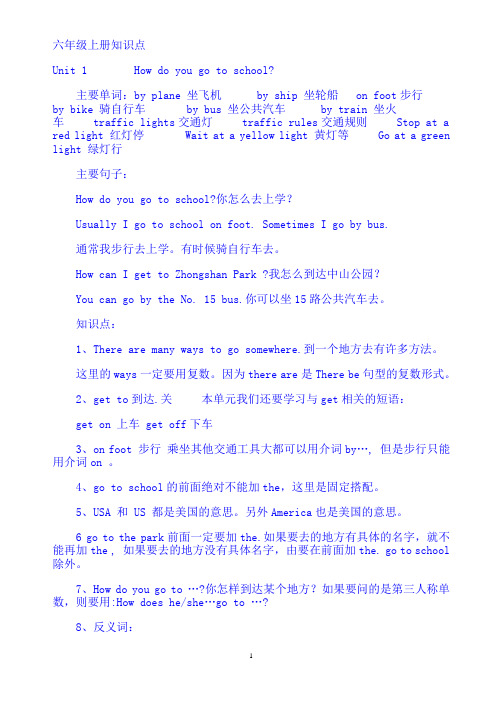
六年级上册知识点Unit 1 How do you go to school?主要单词:by plane 坐飞机 by ship 坐轮船 on foot步行by bike 骑自行车 by bus 坐公共汽车 by train 坐火车 traffic lights交通灯 traffic rules交通规则 Stop at a red light 红灯停 Wait at a yellow light 黄灯等 Go at a green light 绿灯行主要句子:How do you go to school?你怎么去上学?Usually I go to school on foot. Sometimes I go by bus.通常我步行去上学。
有时候骑自行车去。
How can I get to Zhongshan Park ?我怎么到达中山公园?You can go by the No. 15 bus.你可以坐15路公共汽车去。
知识点:1、There are many ways to go somewhere.到一个地方去有许多方法。
这里的ways一定要用复数。
因为there are是There be句型的复数形式。
2、get to到达.关本单元我们还要学习与get相关的短语:get on 上车 get off下车3、on foot 步行乘坐其他交通工具大都可以用介词by…, 但是步行只能用介词on 。
4、go to school的前面绝对不能加the,这里是固定搭配。
5、USA 和 US 都是美国的意思。
另外America也是美国的意思。
6 go to the park前面一定要加the.如果要去的地方有具体的名字,就不能再加the , 如果要去的地方没有具体名字,由要在前面加the. go to school 除外。
7、How do you go to …?你怎样到达某个地方?如果要问的是第三人称单数,则要用:How does he/she…go to …?8、反义词:get on(上车)---get off(下车) near(近的)—far(远的) fast(快的)—slow(慢的) because(因为)—why(为什么)same(相同的)—different(不同的)9、近义词:see you---goodbye sure---certainly---of course10、频度副词:always 总是,一直 usually 通常 often经常 sometimes 有时候 never 从来不Unit 2 Where is the science museum?主要单词:library 图书馆 post office 邮局 hospital医院 cinema 电影院 bookstore书店 science museum科学博物馆 turn left向左转 turn right 向右转 go straight 直行 north北 south南 east东 west西主要句子:Where is the cinema, please? 请问电影院在哪里?It’s next to the hospital. 它与医院相邻。
PEP小学英语六年级上册全册教案完整版
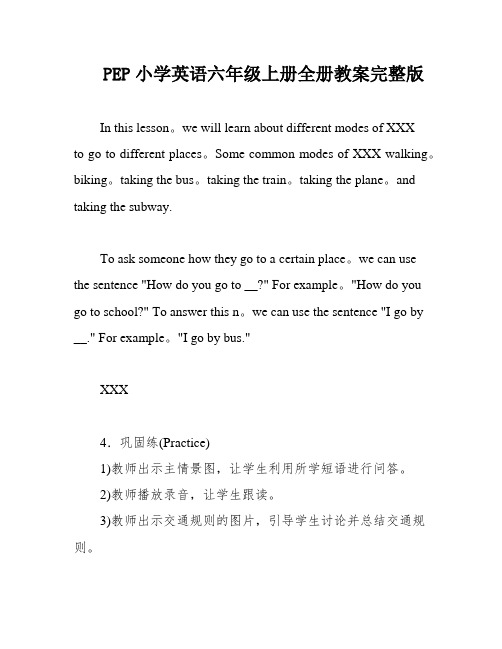
PEP小学英语六年级上册全册教案完整版In this lesson。
we will learn about different modes of XXXto go to different places。
Some common modes of XXX walking。
biking。
taking the bus。
taking the train。
taking the plane。
and taking the subway.To ask someone how they go to a certain place。
we can use the sentence "How do you go to __?" For example。
"How do you go to school?" To answer this n。
we can use the sentence "I go by __." For example。
"I go by bus."XXX4.巩固练(Practice)1)教师出示主情景图,让学生利用所学短语进行问答。
2)教师播放录音,让学生跟读。
3)教师出示交通规则的图片,引导学生讨论并总结交通规则。
5.课堂小结(Summary)本课我们研究了不同的交通方式,学会了如何用英语问别人如何去某个地方,以及如何回答这个问题。
同时,我们也研究了交通规则并了解了交通安全的重要性。
6.课后作业(Homework)1)完成Let'slearn部分的练。
2)写一篇短文介绍自己通常怎样去学校或其他地方。
注:本教案可根据实际情况进行适当调整。
1.教师可以通过自问自答的方式来引导学生研究交通方式的表达。
例如,教师可以问:“How do I go to school。
I go to school by bike.” 然后在黑板上写下“by bike”,并帮助学生说出完整的句子“ I go to school by…” 并将相应的短语写在黑板上。
人教版(PEP)小学英语六年级上册全册知识点(含作文)
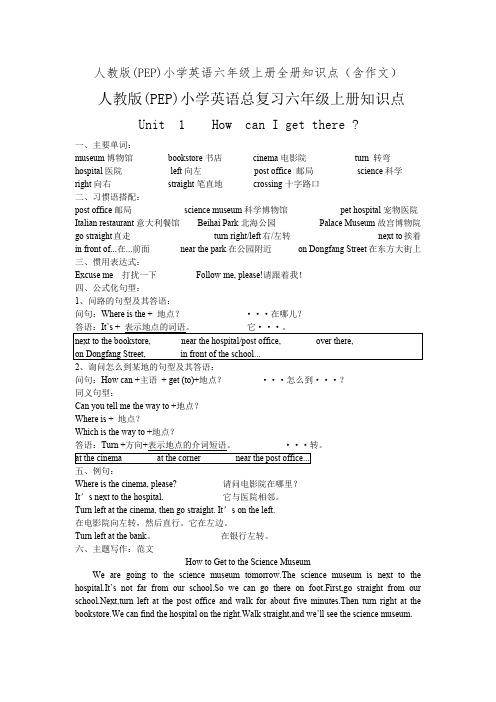
人教版(PEP)小学英语六年级上册全册知识点(含作文)人教版(PEP)小学英语总复习六年级上册知识点Unit 1 How can I get there ?一、主要单词:museum博物馆bookstore书店cinema电影院turn 转弯hospital医院left向左post office 邮局science科学right向右straight笔直地crossing十字路口二、习惯语搭配:post office邮局science museum科学博物馆pet hospital宠物医院Italian restaurant意大利餐馆Beihai Park北海公园Palace Museum故宫博物院go straight直走turn right/left右/左转next to挨着in front of...在...前面near the park在公园附近on Dongfang Street在东方大街上三、惯用表达式:Excuse me 打扰一下Follow me, please!请跟着我!四、公式化句型:1、问路的句型及其答语:问句:Where is the + 地点?···在哪儿?答语:It’s + 表示地点的词语。
它···。
next to the bookstore, near the hospital/post office, over there,on Dongfang Street, in front of the school...2、询问怎么到某地的句型及其答语:问句:How can +主语+ get (to)+地点?···怎么到···?同义句型:Can you tell me the way to +地点?Where is + 地点?Which is the way to +地点?答语:Turn +方向+表示地点的介词短语。
Pep人教版小学英语六年级上册语法练习
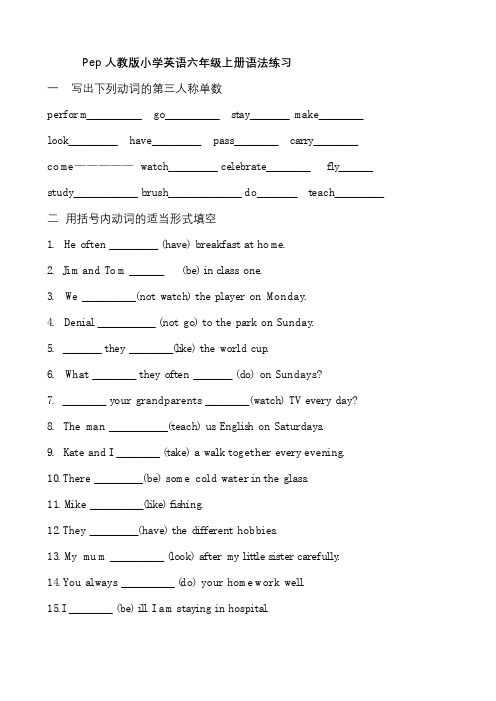
Pep人教版小学英语六年级上册语法练习一写出下列动词的第三人称单数per for m___________go___________s t ay________ make_________ look__________have__________pass_________car r y_________co me—————watch__________ ce lebrate_________f l y_______ s tudy_____________ brush_______________do________t each__________ 二用括号内动词的适当形式填空1.He of ten __________(have) breakfas t at ho me.2. J im and To m _______ (be)in c lass one.3.We ___________(not watch)the p layer on Monday.4.Den ia l____________(not go)to the park on Sunday.5.________they _________(l i ke)the wor ld cup.6.What _________they of t en ________(do) on Sundays?7._________ your grandparents _________(watch) TV every day?8.The man ____________(teach) us Eng l i s h on Saturdays.9.Kate and I_________(take) a wa lk together every even ing.10.There __________(be)som e co ld water in the g lass.11.Mike ___________(l i ke)f i s hing.12.They __________(have)the d i f fe rent hobbies.13.My mu m ___________(look) a f ter my l i t t le s i s ter carefu l l y.14.You a lways___________(do) your hom e w ork we l l.15.I_________(be)i l l.I am stay ing in hospi ta l.16.She _________(not go)t o school on Sundays.17.Yang Ming ___________(do) not l i ke Engl i sh.18.The ch i ld of ten__________(watch) TV on weekends.19.Danie l and John _________(have)s i x l essons th i s term.20.–What day _________(be)i t today?--I t’s Monday.三按要求完成句子1.Mi mi s tar t s to dance a t7:30.(改为否定句)——————————————————————————2.They of ten eat the i r lunch outs ide t he c lass roo m.(一般疑问句,作否定回答) ——————————————————————————————3.Lucy l i kes co l lec t ing p icture cards.(一般疑问句,作肯定回答)——————————————————————————————4.Dan ie l l i kes p lay ing com p uter ga mes.(一般疑问句,作否定回答)________________________________________________________________5.They go t o school every morn ing.(改为否定句)—————————————————————————6.A my speaks Eng l i sh very we l l.(改为否定句)__________________________________________________________________7.My unc le l i kes tak ing p i ctures on the s t reet.(对划线部分提问)——————————————————————————8. John co m es f ro m Germ any.(对划线部分提问)___________________________________________________9.My hobby i s co l lec t ing m a ps.(一般疑问句,作否定回答)——————————————————————————10.Dan ie l and h is brother l i ke go ing skat ing.(否定句)————————————————————————————四改错1. I s your s i s t er speak Engl i sh?_________2.Does your fa ther l i kes going f i sh ing?__________3.L iu Wei l i k es p lay co mp uter ga mes af te r c lass._____________4.Mr Wang teachs us ar t._________________5.He don’t do h is ho mew ork on Saturdays.____________16.She _________(not go)t o school on Sundays.17.Yang Ming ___________(do) not l i ke Engl i sh.18.The ch i ld of ten__________(watch) TV on weekends.19.Danie l and John _________(have)s i x l essons th i s term.20.–What day _________(be)i t today?--I t’s Monday.三按要求完成句子1.Mi mi s tar t s to dance a t7:30.(改为否定句)——————————————————————————2.They of ten eat the i r lunch outs ide t he c lass roo m.(一般疑问句,作否定回答) ——————————————————————————————3.Lucy l i kes co l lec t ing p icture cards.(一般疑问句,作肯定回答)——————————————————————————————4.Dan ie l l i kes p lay ing com p uter ga mes.(一般疑问句,作否定回答)________________________________________________________________5.They go t o school every morn ing.(改为否定句)—————————————————————————6.A my speaks Eng l i sh very we l l.(改为否定句)__________________________________________________________________7.My unc le l i kes tak ing p i ctures on the s t reet.(对划线部分提问)——————————————————————————8. John co m es f ro m Germ any.(对划线部分提问)___________________________________________________9.My hobby i s co l lec t ing m a ps.(一般疑问句,作否定回答)——————————————————————————10.Dan ie l and h is brother l i ke go ing skat ing.(否定句)————————————————————————————四改错1. I s your s i s t er speak Engl i sh?_________2.Does your fa ther l i kes going f i sh ing?__________3.L iu Wei l i k es p lay co mp uter ga mes af te r c lass._____________4.Mr Wang teachs us ar t._________________5.He don’t do h is ho mew ork on Saturdays.____________16.She _________(not go)t o school on Sundays.17.Yang Ming ___________(do) not l i ke Engl i sh.18.The ch i ld of ten__________(watch) TV on weekends.19.Danie l and John _________(have)s i x l essons th i s term.20.–What day _________(be)i t today?--I t’s Monday.三按要求完成句子1.Mi mi s tar t s to dance a t7:30.(改为否定句)——————————————————————————2.They of ten eat the i r lunch outs ide t he c lass roo m.(一般疑问句,作否定回答) ——————————————————————————————3.Lucy l i kes co l lec t ing p icture cards.(一般疑问句,作肯定回答)——————————————————————————————4.Dan ie l l i kes p lay ing com p uter ga mes.(一般疑问句,作否定回答)________________________________________________________________5.They go t o school every morn ing.(改为否定句)—————————————————————————6.A my speaks Eng l i sh very we l l.(改为否定句)__________________________________________________________________7.My unc le l i kes tak ing p i ctures on the s t reet.(对划线部分提问)——————————————————————————8. John co m es f ro m Germ any.(对划线部分提问)___________________________________________________9.My hobby i s co l lec t ing m a ps.(一般疑问句,作否定回答)——————————————————————————10.Dan ie l and h is brother l i ke go ing skat ing.(否定句)————————————————————————————四改错1. I s your s i s t er speak Engl i sh?_________2.Does your fa ther l i kes going f i sh ing?__________3.L iu Wei l i k es p lay co mp uter ga mes af te r c lass._____________4.Mr Wang teachs us ar t._________________5.He don’t do h is ho mew ork on Saturdays.____________16.She _________(not go)t o school on Sundays.17.Yang Ming ___________(do) not l i ke Engl i sh.18.The ch i ld of ten__________(watch) TV on weekends.19.Danie l and John _________(have)s i x l essons th i s term.20.–What day _________(be)i t today?--I t’s Monday.三按要求完成句子1.Mi mi s tar t s to dance a t7:30.(改为否定句)——————————————————————————2.They of ten eat the i r lunch outs ide t he c lass roo m.(一般疑问句,作否定回答) ——————————————————————————————3.Lucy l i kes co l lec t ing p icture cards.(一般疑问句,作肯定回答)——————————————————————————————4.Dan ie l l i kes p lay ing com p uter ga mes.(一般疑问句,作否定回答)________________________________________________________________5.They go t o school every morn ing.(改为否定句)—————————————————————————6.A my speaks Eng l i sh very we l l.(改为否定句)__________________________________________________________________7.My unc le l i kes tak ing p i ctures on the s t reet.(对划线部分提问)——————————————————————————8. John co m es f ro m Germ any.(对划线部分提问)___________________________________________________9.My hobby i s co l lec t ing m a ps.(一般疑问句,作否定回答)——————————————————————————10.Dan ie l and h is brother l i ke go ing skat ing.(否定句)————————————————————————————四改错1. I s your s i s t er speak Engl i sh?_________2.Does your fa ther l i kes going f i sh ing?__________3.L iu Wei l i k es p lay co mp uter ga mes af te r c lass._____________4.Mr Wang teachs us ar t._________________5.He don’t do h is ho mew ork on Saturdays.____________。
人教版(PEP)小学英语六年级上册各单元知识点归纳(三年级起点)
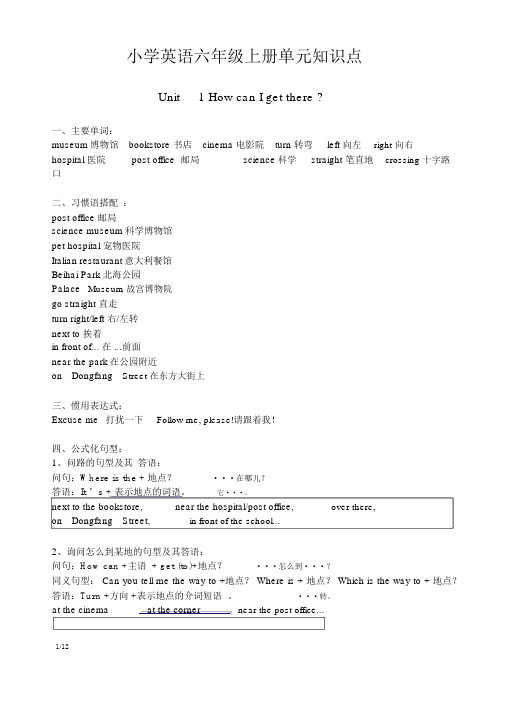
小学英语六年级上册单元知识点Unit 1 How can I get there ?一、主要单词:museum博物馆bookstore 书店cinema 电影院turn 转弯left 向左right 向右hospital 医院post office 邮局science科学straight 笔直地crossing 十字路口二、习惯语搭配:post office 邮局science museum科学博物馆pet hospital 宠物医院Italian restaurant意大利餐馆Beihai Park 北海公园Palace Museum 故宫博物院go straight 直走turn right/left 右/左转next to 挨着in front of... 在 ...前面near the park在公园附近on Dongfang Street 在东方大街上三、惯用表达式:Excuse me打扰一下Follow me, please!请跟着我!四、公式化句型:1、问路的句型及其答语:问句:Where is the + 地点?···在哪儿?答语:It ’s + 表示地点的词语。
它···。
next to the bookstore,near the hospital/post office,over there,on Dongfang Street,in front of the school...2、询问怎么到某地的句型及其答语:问句:How can +主语 + get (to)+地点?···怎么到···?同义句型: Can you tell me the way to +地点? Where is + 地点? Which is the way to + 地点?答语:Turn +方向 +表示地点的介词短语。
人教版pep六年级英语上下册英语课文及翻译整理
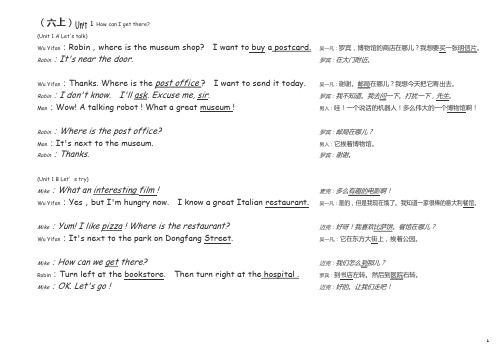
123supermarket 超市evening 晚上,傍晚45奥利弗:好主意!78910W: What size are your shoes, Mike?M: Size 7W: Size 7? That’s so small.than mine. My shoes are size 37.M: Really? You look How heavy are you? M: I’m 48 kilogram sW: Yes, you’re heavier. I’m 46 kilograms.迈克:橱窗里的那些鞋很漂亮!让我们看一看。
吴一凡:迈克,你穿多大号的鞋?迈克:7号。
countryside 乡村吴一凡:7号?那真小。
迈克:在中国我穿38号的鞋。
吴一凡:哦!你的脚比我的大。
我穿37号的鞋。
迈克:我体重48千克。
吴一凡:是的,你更重。
我体重46千克。
11六下(Unit 1, B: Read and write) Little Duck is watching the sun go down.but his shadow is getting long er and long er .“Why is that?” his friend Old Tree. “You are old er and than me.Tell me –why is my shadow long er when the sun get s lower?”Old Tree say s , ”That ’s easy, Little duck.The sun go es down every day, and we grow old er every day. Your shadow grow s long er because you are growing tall er . You are becoming a beautiful bird!”M: Isome children’s show s on TV.M :Yes ,I my room and my clothes.G :它正变得越来越低,但是他的影子正变得越来越长。
人教版新版PEP小学六年级上册英语短语表

人教版新版PEP小学六年级上册英语短语表一、日常会话短语- Hello! 你好!- Good morning/afternoon/evening! 早上/下午/晚上好!- How are you? 你好吗?- I'm fine, thank you. And you? 我很好,谢谢。
你呢?- What's your name? 你叫什么名字?- My name is [name]. 我叫[name]。
- Nice to meet you! 很高兴认识你!- How old are you? 你几岁了?- I'm [age] years old. 我[age]岁了。
- Where are you from? 你来自哪里?- I'm from [place]. 我来自[place]。
- What's your favorite color/food/sport, etc.? 你最喜欢的颜色/食物/运动等是什么?二、常用动词短语- Go to school 去学校- Study English 研究英语- Play football 踢足球- Eat breakfast/lunch/dinner 吃早餐/午餐/晚餐- Get up 起床- Go to bed 上床睡觉- Brush teeth 刷牙- Wash hands 洗手- Listen to music 听音乐- Watch TV 看电视- Read a book 阅读一本书三、常用名词短语- School bag 书包- Classroom 教室- Textbook 课本- Pen 钢笔- Pencil 铅笔- Eraser 橡皮擦- Ruler 尺子- Sports field 运动场- Library 图书馆- Teacher 老师- Student 学生四、常用句型短语- What's this/that? 这/那是什么?- It's a [object]. 这是一个[object]。
PEP六年级小学英语上册教案全册及反思

PEP六年级小学英语上册教案全册及反思目录•引言•教案一:Unit 1 Hello–教学目标–教学内容–教学步骤–教学反思•教案二:Unit 2 My Family–教学目标–教学内容–教学步骤–教学反思•教案三:Unit 3 My School Bag –教学目标–教学内容–教学步骤–教学反思•教案四:Unit 4 My Room–教学目标–教学内容–教学步骤–教学反思•总结引言《PEP六年级小学英语上册教案全册及反思》是对PEP六年级小学英语上册的教学教案进行总结和反思的文档。
本文档将会按照教学单元依次介绍每个教案的教学目标、教学内容、教学步骤以及教学反思,为教师们提供参考和借鉴。
教案一:Unit 1 Hello教学目标•学习并掌握问候语Hello、Hi、Good morning和Good afternoon的用法。
•能够准确使用问候语进行日常交际。
•能够听懂并模仿简单的日常问候对话。
教学内容•单词:Hello、Hi、Good morning、Good afternoon•日常问候对话教学步骤1.引入新课,通过播放问候视频引起学生的兴趣。
2.教师用图片和动作展示问候语,引导学生模仿。
3.学生进行角色扮演,在教师的引导下使用问候语进行对话。
4.教师播放听力材料,帮助学生听懂日常问候对话。
5.学生根据听到的对话进行回答,并模仿读对话。
6.教师布置家庭作业。
教学反思本节课通过生动有趣的视频、图片和角色扮演等教学方法,激发学生兴趣,帮助学生学习和掌握了问候语的用法。
通过听力训练和模仿对话,学生巩固了所学内容。
然而,由于时间限制,对于某些学生来说,练习的时间可能仍然不够,下次可以适当调整教学步骤,留出更多时间给学生进行练习。
教案二:Unit 2 My Family教学目标•学习并掌握家庭成员的称呼,如father、mother、brother、sister等。
•能够用英语介绍自己的家庭成员。
•能够听懂并模仿简单的家庭成员介绍对话。
人教版(PEP)小学英语六年级上册知识点归纳
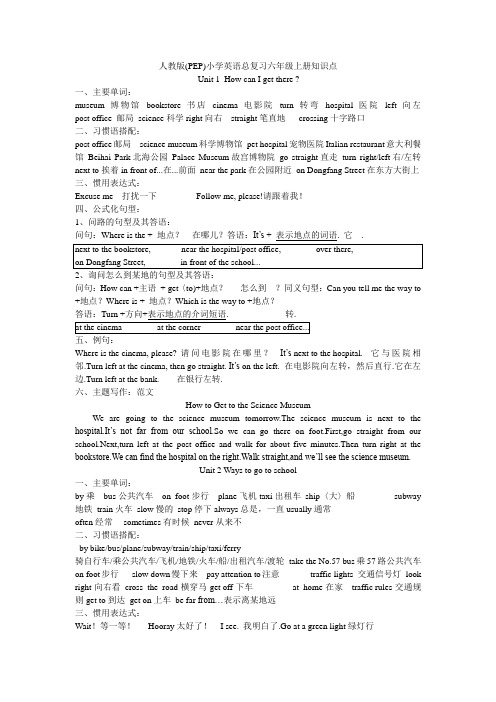
人教版(PEP)小学英语总复习六年级上册知识点Unit 1 How can I get there ?一、主要单词:museum博物馆bookstore书店cinema电影院turn 转弯hospital医院left向左post office 邮局science科学right向右straight笔直地crossing十字路口二、习惯语搭配:post office邮局science museum科学博物馆pet hospital宠物医院Italian restaurant意大利餐馆Beihai Park北海公园Palace Museum故宫博物院go straight直走turn right/left右/左转next to挨着in front of...在...前面near the park在公园附近on Dongfang Street在东方大街上三、惯用表达式:Excuse me 打扰一下Follow me, please!请跟着我!四、公式化句型:1、问路的句型及其答语:问句:Where is the + 地点?···在哪儿?答语:It’s + 表示地点的词语. 它···.2、询问怎么到某地的句型及其答语:问句:How can +主语+ get〈to)+地点?···怎么到···?同义句型:Can you tell me the way to +地点?Where is + 地点?Which is the way to +地点?答语:Turn +方向+表示地点的介词短语. ···转.五、例句:Where is the cinema, please? 请问电影院在哪里?It’s next to the hospital. 它与医院相邻.Turn left at the cinema, then go straight. It’s on the left. 在电影院向左转,然后直行.它在左边.Turn left at the bank. 在银行左转.六、主题写作:范文How to Get to the Science MuseumWe are going to the science museum tomorrow.The science museum is next to the hospital.It’s not far from our school.So we can go there on foot.First,go straight from our school.Next,turn left at the post office and walk for about five minutes.Then turn right at the bookstore.We can find the hospital on the right.Walk straight,and we’ll see the science museum.Unit 2 Ways to go to school一、主要单词:by乘bus公共汽车on foot步行plane飞机taxi出租车ship〈大〉船subway 地铁train火车slow慢的stop停下 always 总是,一直 usually 通常often经常sometimes 有时候 never 从来不二、习惯语搭配:by bike/bus/plane/subway/train/ship/taxi/ferry骑自行车/乘公共汽车/飞机/地铁/火车/船/出租汽车/渡轮take the No.57 bus乘57路公共汽车on foot步行slow down慢下来pay attention to注意traffic lights 交通信号灯look right向右看cross the road横穿马get off下车at home在家traffic rules交通规则 get to到达get on 上车be far from…表示离某地远三、惯用表达式:Wait!等一等!Hooray太好了!I see. 我明白了.Go at a green light 绿灯行Stop at a red light 红灯停Wait at a yellow light 黄灯等四、公式化句型:1、如何询问对方的出行方式:How do you come(to)+地点?你〈们〉怎么来···的?2、如何用must表示必须做某事:某人+must+动词原形〈+其它〉···必须···.3、告诫别人不要做某事的句型:Don’t +动词原形〈+其它〉.不要/别···.五、例句:How do you go to school? 你怎么去上学?Usually I go to school on foot. Sometimes I go by bus. 通常我步行去上学.有时候骑自行车去. How can I get to Zhongshan Park ? 我怎么到达中山公园?You can go by the No. 15 bus. 你可以坐15路公共汽车去. I am far from school now. 我现在离学校很远. My home is not far from our school. My home is near our school.我家离学校不远.六、主题写作:范文Don’t Be Against the Traffic RulesI go to school from Mondays to Fridays. I go to school by bike at 7:30 in the morning.I have to cross two busy roads.I know the traffic rules well.Slow down and stop at a yellow light.Stop and wait at a red light.Go at a green light.I always ride on the right side of the road.I am never against the traffic rules.Unit 3 My weekend plan一、主要单词:tomorrow明天film电影supermarket超市trip旅行tonight在今晚evening晚上/傍晚next week下周comic连环画杂志dictionary词典word单词post card明信片visit拜访二、习惯搭配:take a trip去旅行go for a picnic去野餐go to the cinema去看电影learn to swim学习游泳visit my grandparents看望我〈外〉祖父母get together 聚会go to the supermarket去超市go ice-skating去滑冰make a snowman堆雪人see a film看电影make mooncakes做月饼read a poem朗诵一首诗this weekend这周末Renmin Park人民公园next week下周this morning/afternoon/evening今天上午/下午/晚上next Wednesday下星期三三、惯用表达式:What about you?你呢?Here they are!它们在这儿!Can I help you?我能帮助你吗?Sounds great!听起来很棒!Have a good time!玩得开心!You too.你也是四、公式化句型:1、询问对方打算做什么的句型及其答语:问句:What are you going to do +其它?你/你们···打算做什么?答语:I’m/We’re going to +动词〈短语〉原形+其它. 我/我们打算···.2、询问对方打算去哪儿的句型及答语:问句:Where are you going(+将来时间)? 你/你们打算〈···〉去哪儿?答语:I’m/We’re going〈to the)+地点. 我/我们打算去···.3、询问对方打算何时去做某事的句型及答语:问句:When are you going to +动词〈短语〉原形?你/你们打算什么时候···?答语:I’m/We’re going to +动词〈短语〉原形+将来时间. 我/我们打算···.五、例句:What are you going to do on the weekend? 你周末打算做什么?I’m going to visit my grandparents this weekend? 这个周末我打算去看望我的外祖父母. Where are you going this afternoon? 你今天下午打算去哪里?I’m going to the bookstore. 我打算去书店.What are you going to buy? 你打算去买什么?I’m going to buy a comic book. 我打算去买一本漫画书.六、主题写作:范文Let’s Have a Nice Day!Today is Saturday.Tomorrow morning I’m going to the bookstore with my friends.We are going to look for some good books.We all like reading books.We are going to have lunch in a restaurant.I like chicken,beef and vegetables.After lunch,we are going to the Summer Palace by bus.We are going to play near the Kunming Lake.Maybe we are going to row a boat on the lake.That will be great!We are coming back at 5 in the afternoon.Unit 4 I have a pen pal一、主要单词:studies学习(第三人称单数形式〉puzzle谜hiking远足二、习惯搭配:read stories读故事do kungfu练功夫fly kites放风筝play the pipa弹琵琶play sports进行体育活动climb mountains爬山listen to music听音乐sing English songs唱英文歌on a farm在一个农场里live in...住在···write an email to...给···写一封电子邮件on the playground在运动场上三、惯用表达式:Me too.我也是. Really?真的吗?四、公式化句型:1、询问某人爱好的句型及其答语:问句:What are sb.’s hobbies? ···有什么爱好?答语:主语+like/likes+动词-ing形式〈+其它〉. ···喜欢···.2、由do/does引导的一般疑问句及其答语:问句:Do/Does+主语+动词原形+其它?答语:Yes,主语+do/does. /No,主语+don’t/doesn’t.五、语法:1、动词变为动名词的规则:动词变为动名词,即是动词加ing.一般要遵循以下三条规则:(1)一般情况下,在动词的后面直接加ing.如:play—playing read—reading do—doing go—going(2)以不发音的字母e结尾的动词,要去掉不发音的字母e,再加ing.如:write—writing ride—riding make—making dance—dancing〈3)以单元音加单辅音结尾的重读闭音节,要双写最后一个辅音字母,再加ing.如:run—running swim—swimming put—putting sit—sitting2、关于第三人称单数:动词变为第三人称单数形式的规则:(1)在一个句子中,如果主语人称既不是你,也不是我,而是另外的一个人,这时的人称叫做第三人称单数.(2)在第三人称单词的句子中,动词要使用第三人称单词形式.(3)动词变为第三人称单数形式,要遵循以下规则:①一般情况下,在动词的后面直接加s.如:read--reads make—makes write—writes②以字母s, x, o , sh , ch结尾的动词,在词尾加es.如:do—does wash—washes teach—teaches go—goes pass—passes③以y结尾的动词分为两个情况,以元音字母加y结尾的动词,在词尾直接加s.如:play—plays buy--buys以辅音字母加y结尾的动词,要把y变为i,再加es.如:study--studies④以f , fe结尾的名词,先把f,fe变为v,再加-es.⑤特殊变化:have--has(4)在一个第三人称单数的句子中,只要句子中出现了does或者其否定形式doesn’t.该句子中的其他动词就要使用原形.(5)第三人称单数的肯定句在变为否定句时,在动词的前面加doesn’t.动词恢复原形.如:he lives in Beijing.---he doesn’t live in Beijing.(6) 第三人称单数的陈述句在变为一般疑问句时,用does开头,后面的动词也要变为原形.如:he lives in Beijing.---Does he live in Beijing?3、注意几个单词的变化: hobby(复数形式)—hobbies have to(同义词)—must六、反义词或对应词:get on(上车)---get off(下车) near(近的)—far(远的) fast(快的)—slow(慢的) because(因为)—why(为什么) same(相同的)—different(不同的) here(这里)---there(那里) east(东)---west(西) north(北)---south(南) left(左)---right(右) get on (上车)---get off(下车)近义词:see you---goodbye sure---certainly---of course七、主题写作:范文Li Ying’s HobbiesLi Ying likes English very much.She works hard at it.She reads English every morning.She likes speaking English .She likes listening to the radio,too.She watches TV only on Saturday evening.Does she like cooking Chinese food?No, she doesn’t.She likes doing word puzzles.She doesn’t like playing basketball.Her parents love her.All the teachers love her,too.She says her hobbies make her happy.Unit 5 What does he do?一、重点单词:factory工厂postman邮递员police officer警察fisherman渔民scientist科学家pilot飞行员coach教练businessman商人;企业家worker工人二、习惯搭配:by car/bus/bike/plane/boat乘小汽车/公共汽车/自行车/飞机/船go to work去上班study hard 努力学习stay healthy保持健康go home 回家lots of 许多go to the camp去度假营be good at...擅长···三、惯用表达式:Cool!酷!What about you?你呢?That’s nice.那真好. I see.我明白了.四、公式化句型:1、询问他人的职业的句型及其答语;问句:What does+主语〈第三人称单数〉+do? ···是做什么的?答语:He/She is a /an+职业名称. 他/她是一位···.2、询问他人的工作地点的句型及其答语:问句:Where does+主语〈第三人称单数〉+work?···在哪儿工作?答语:He/She works+〈表示地点的〉介词短语. 他/她···工作.3、询问他人的上班方式的问句及其答语:问句:How does +主语〈第三人称单数〉+go to work? ···怎么去上班?答语:He/She goes to work+交通方式. 他/她···去上班.by bike/bus/subway/plane/train/ship/ferry/...on foot五、一些由动词变化而来的职业名词:teach—teacher clean—cleaner sing—singer dance—dancer drive—driver write—write r TV report—TV reporter act—actor act—actress art—artist engine—engineer六、主题写作:范文I Love My FamilyHere is a photo of my family.There are four people in my family.They are my father,my mother, my brother and me.My father is a doctor.He works in a hospital.He goes to work by subway.My mother is a teacher.She works in a school near my home.She goes to work by bike.Look, the tall boy is my brother.He is older than me.He is a pilot.He’s in Beijing now.He goes there by plane.I am a student now.I love my family.Unit 6 How do you feel ?一、主要单词:angry生气的afraid害怕worried担心的;发愁的happy高兴的see a doctor看病more更多的wear穿deep深的breath呼吸〈名词〉count数数〈动词〉sad难过的二、习惯搭配:feel angry/ill/happy/sad感觉生气/不舒服/高兴/难过be afraid of...害怕···be angry with...与···生气take a deep breath深深吸一口气count to ten 数到十see a doctor看病do more exercise做更多的运动wear warm clothes穿暖和的衣服chase the mice追赶老鼠drink some drinks喝一些饮料have some popcorn吃一些爆米花三、惯用表达式:Here you are.给你. Wait for me.等我一下. Yum!太美味了!四、公式化句型:1、描述某人/某物害怕什么的句型:主语+be动词+afraid of +其他. ···害怕···.2、描述某人/某物与什么生气的句型:主语+be动词+angry with+其他. ···与···生气.3、询问某人怎么了的句型及其答语:问句:What’s wrong? What’s the matter(with you)? 怎么了?答语:某人+所处的状况.4、建议某人应该做某事的句型某人+should +动词〈短语〉原形+其他. ···应该···.五、做“对句子划线部分提问”试题时,一般应该遵循三个步骤:〈1〉. 确定与句子划线部分相应的特殊疑问词,并且特殊疑问词代替相应的划线部分. 〈2〉. 把特殊疑问词代替划线部分后的句子变成一般疑问句.〈3〉. 最后再把特殊疑问词提到句首.以上三个基本步骤可以用三个字来概括,即:定,问,提.例如: This is a book ?①This is what. ②Is this what ? ③What is this ?注意:句①②只是一种变化过程,不必写入试题中.句③才是试题所要求的形式和结果,必须写到试题上.以上三个步骤是对句子划线部分提问最基本的过程.六、主题写作:范文What Should You Do?When you fell sad or worried,what should you do ? Let me tell you.First you should take adeep breath .Then you should listen to some music.Next you will be relax ed.You won’t be so sad or worried.When you are afraid,what should you do? It’s easy.You should ask your friends for help.If you have friends with you,you won’t feel afraid.Try to be happy every day.英语疑问词what,how,who,why,where,when的用法.一、what 什么用来问是什么,叫什么,做什么等1. What’s your name? 你叫什么名字?2.What is in your box? 你的盒子里是什么?3. What’s your father?=What does your father do? 你爸爸是干什么的?一〉What time 什么时间用来问时间 What time is it? 几点了?二〉What colour 什么颜色用来问颜色 What colour is your bag? 你的书包是什么颜色?三〉What about 怎么样用来征求意见或询问感受等,大多用于承接上面的同样问题.1.What bout this pair of shoes? 这双鞋子怎么样?2.What about you? 你呢?3.What about your dad? 你爸爸呢?四〉What day 星期几用来问星期几 What day is it today/tomorrow? 今天/明天星期几?五〉What date 什么日期问具体的日期1.What’s the date today? 今天是几号? 2. What date is tomorrow? 明天是几号?六〉What …for为何目的用来问目的,在一定情况下可以与why互换What did you buy that for?=Why did you buy that? 你为什么要买那个?二、when 什么时候用来问时间When do you get up?你什么时候起床?三、where 哪里用来问地点1. Where is my ruler? 我的尺子在哪里?2. Where are you going to ? 你打算去哪里?3.Where are you from? =Where do you come from? 你是哪里人?四、which 哪一个用来问具体的哪一个1. Which season do you like best? 你最喜欢哪个季节?2.Which class are you in? 你在哪一个班?3.Which one is my pen?哪一支是我的钢笔?五、Who 谁用来问人物是谁1.Who is that boy?那个男孩是谁?2. Who are you going to with? 你打算和谁一起去?3. Who is that pretty lady?那个漂亮的女士是谁?六、whose 谁的用来问东西是谁的1. Whose bag is this? 这是谁的包?2.Whose bike is yellow? 谁的自行车是黄色的?七、 why 为什么用来问原因1.Why do you like spring? 你为什么喜欢春天?2. Why did you go there? 你为什么去那里?八、 how 怎么样用来询问身体等状况1. How are you? 你好吗?2. How is your mother? 你妈妈好吗?一〉How old 几岁用来问年龄 How old are you? 你几岁了?二〉How long 多长用来问长度 How long are your legs? 你的腿多长?三〉How big 多大用来问物体的大小How big is your bedroom? 你的卧室多大?四〉How tall 多高用来问高度How tall is your brother? 你弟弟有多高?五〉How heavy 多重用来问重量 How heavy are you? 你有多重?六〉 How far 多远用来问路程 2 How far is it from here? 从这儿去有多远?七〉How many 多少用来问数量 How many apples do you have? 你有多少苹果?八〉How much 多少钱用来问价格how much is this dress? 这个连衣裙多少钱?九〉How about 怎么样用来征求意见或询问感受等,大多用于承接上面的同样问题,用法与what about相同1. How about you? 你呢?2. How about that shirt? 那件衬衣怎么样?。
PEP小学六年级上册英语知识点归纳

PEP小学六年级上册英语知识点归纳PEP六年级上册知识点归纳Unit1 How can I get there?XXX)post office邮局XXXturn left左转turn right右转places:。
cinema电影院地点)。
bookstore书店go XXXcrossing十字路口supermarket超市school学校一、描述某地点所处位置的短语near在…。
附近next to与…。
相邻XXX在…。
旁边in front of在……前面XXX在…。
后面XXX在…。
之间2、问路1.Where is the cinema。
please?请问电影院在哪儿?XXX在医院的旁边。
XXX在学校的前面.XXX在公园的背面It’XXX在植物园的邻近.XXX.离这儿很远.2.Excuse me。
is there a cinema near here请问这附近有电影院吗?Yes。
there is。
/No,there isn’t.有./没有。
3.How can I/we get there?我怎样到那儿?XXX left XXX到书店左转4.How can I get to the hospital?我该如何抵达病院呢?Take the No.57 bus.乘坐第57路公汽。
By the No。
57 bus.注意:到那儿get。
there到某地get to。
Canada/XXX二、指引路1.You can take the No.32 bus.你可乘坐32路公交车去那儿.注意:You can go by the No.32 bus.与上句意思一样,只是说法不同。
2.Go straight and turn。
left at the。
bookstore.先直行然后在书店那儿左转弯。
3.Turn right/ left at the …在…地方向右/左转.三Is it far from here?离这儿远吗?Yes。
人教版PEP小学六年级英语Unit-6-How-do-you-feel

⼈教版PEP⼩学六年级英语Unit-6-How-do-you-feel秋季⼈教版PEP⼩学六年级英语Unit-6-How-do-you-feel⼀.重点单词和短语。
angry⽣⽓的afraid害怕的sad难过的worried担⼼的wear穿happy⾼兴地more更多的wait for sb/sth等待某⼈/某物feel angry感觉很⽣⽓see a doctor看病tak e a deep breath深吸⼀⼝⽓count to ten数到⼗a little worried有⼀点点担⼼be angry with…与...⽣⽓be afraid of...害怕..... do more exercise做更多的运动wear warm clothes穿暖和的⾐服wear more clothes穿更多的⾐服get some drinks拿⼀些饮料have some popcorn吃⼀些爆⽶花chase the mice追赶⽼⿏come here来这⾥(反义词)go there去那边⼆.重要句型:1.—How do you feel?—I am sad./I feel sad.2.—How does he/she feel?—He/She is sad.He/She feels sad. 3.—What should I/you/he/she do?—Y ou/He/She/I should tak e a deep breath and count to ten.4.We shouldn’t hurt ants.我们不应该伤害蚂蚁。
5.W e can go next time.下⼀次(next,意为“下⼀个......”)6.He is stuck in the mud.他陷在泥⾥了。
b e stuck in...陷在....⾥7.Please don’t sit on me.I won’t sit on you.8.It is a sunny morning=It is sunny.⽤来回答天⽓情况的句型.It’s+a+描述天⽓的形容词+morning/day/...=it is+描述天⽓的形容词。
pep六年级上册1至3单元知识点
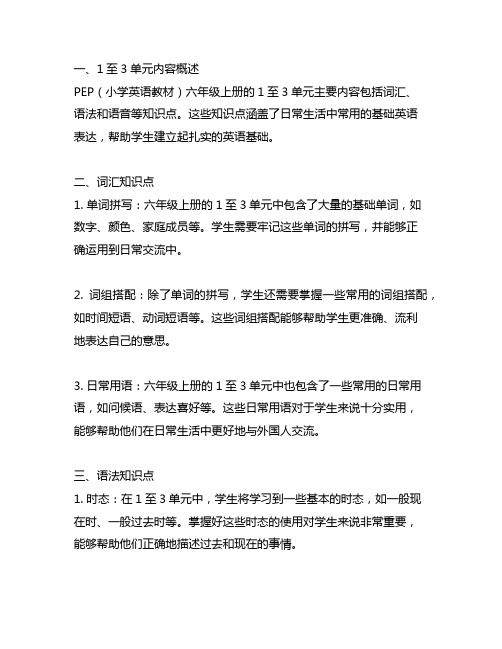
一、1至3单元内容概述PEP(小学英语教材)六年级上册的1至3单元主要内容包括词汇、语法和语音等知识点。
这些知识点涵盖了日常生活中常用的基础英语表达,帮助学生建立起扎实的英语基础。
二、词汇知识点1. 单词拼写:六年级上册的1至3单元中包含了大量的基础单词,如数字、颜色、家庭成员等。
学生需要牢记这些单词的拼写,并能够正确运用到日常交流中。
2. 词组搭配:除了单词的拼写,学生还需要掌握一些常用的词组搭配,如时间短语、动词短语等。
这些词组搭配能够帮助学生更准确、流利地表达自己的意思。
3. 日常用语:六年级上册的1至3单元中也包含了一些常用的日常用语,如问候语、表达喜好等。
这些日常用语对于学生来说十分实用,能够帮助他们在日常生活中更好地与外国人交流。
三、语法知识点1. 时态:在1至3单元中,学生将学习到一些基本的时态,如一般现在时、一般过去时等。
掌握好这些时态的使用对学生来说非常重要,能够帮助他们正确地描述过去和现在的事情。
2. 语法结构:学生还需要掌握一些基本的语法结构,如肯定句、否定句、疑问句等。
这些基本的语法结构是构建语言表达能力的基石,对学生的语言能力提升有着重要的作用。
四、语音知识点1. 发音准确性:在1至3单元中,学生将学习一些基础的英语发音规则,包括元音、辅音的发音技巧等。
通过反复练习,帮助学生提高发音的准确性,使他们能够更加清晰地表达自己的意思。
2. 语音连读:学生还需要学习一些基本的语音连读规则,如连读音、重读音等。
这些规则能够帮助学生更好地理解和模仿地道的英语发音,提高他们的口语表达能力。
五、总结PEP六年级上册的1至3单元涵盖了大量的英语基础知识,包括词汇、语法和语音等方面。
通过系统的学习和练习,学生能够建立起扎实的英语基础,为今后的英语学习打下坚实的基础。
这些知识点也是学生未来学习更复杂英语知识的基础,对于学生的英语学习之路具有重要的意义。
在前面的内容中,我们已经对PEP六年级上册1至3单元的知识点进行了概述,包括词汇、语法和语音等方面。
人民教育出版社小学英语PEP教材六年级上册

人民教育出书社小学英语PEP教材六年级上册Unit 3My weekend plan(the 4thperiod)【教学简案】第4课时【教学详案】课前预习:1.预习听读书P27 Lets' learn教学内容:Unit 3 My weekend plan B Let's learn教学目标:1.能够听、说、读、写本课时主要单词或词组:dictionary, comic book, word book, postcard.2.能够听、说、认读句子:Where are we going I'm going to buy ...等句型描述本身要买的物品。
教学重点:能传闻读写单词:dictionary, comic book, word book, postcard.教学难点:够在情景中运用核心句型完成简单的交际任务。
教学用具:1.多媒体教学过程:一、Warming up1. Enjoy the song: What are you going to doT: Let's listen and sing together.设计意图:歌曲切合本课主题,节奏欢快,易于跟唱,调动学生学习热情。
2. Pair work: What are you/is he going to do(1) T: I'm going to listen to music this evening. What are you going to do this evening S: I'm going to ...教师和一名学生示范问答之后,让学生两人一组,按照实际情况互问互答(2) 课件出示John头像T: What is he going to do this afternoonS: He is going to see a film.T: What is he going to do this eveningS: He is going to buy some books.设计意图:对话问答首先结合学生实际,引出本课话题。
PEP小学英语六年级上下全册知识点总结
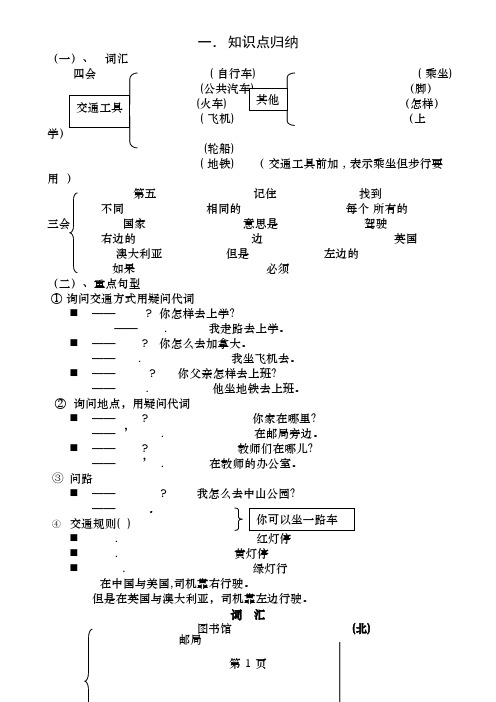
一. 知识点归纳(一)、 词汇乘坐) (脚)火车(怎样) 飞机(上轮船) ( 地铁) ( 交通工具前加 , 表示乘坐但步行要用 )第五 记住 找到不同 相同的 每个 所有的三会 国家 意思是 驾驶右边的 边 英国 澳大利亚 但是 左边的 如果 必须(二)、重点句型① 询问交通方式用疑问代词⏹ —— ? 你怎样去上学?—— . 我走路去上学。
⏹ —— ? 你怎么去加拿大。
—— . 我坐飞机去。
⏹ —— ? 你父亲怎样去上班?—— . 他坐地铁去上班。
② 询问地点,用疑问代词⏹ —— ? 你家在哪里?—— ’ . 在邮局旁边。
⏹ —— ? 教师们在哪儿?—— ’ . 在教师的办公室。
③ 问路⏹ —— ? 我怎么去中山公园?—— .④ 交通规则( )⏹ ⏹ . 黄灯停 ⏹ . 绿灯行在中国与美国,司机靠右行驶。
但是在英国与澳大利亚,司机靠左边行驶。
词 汇图书馆 (北) 邮局医院: 电影院(地点) 书店 (东) (西)科学博物馆银行学校(南)超市鞋店在哪里请与…相邻右边,正确的左边成直线地然后转弯对不起想要双分钟告诉乘坐远放学以后上车下车第十二聚会;晚会开始买句型一、问路. , ? 请问电影院在哪儿?. 在医院的旁边。
. 在学校的前面.在公园的后面’ . 在动物园的附近.. 在书店的左右边.. 在银行的东边.. 离这儿很远.. , 请问这附近有电影院吗?, . 有.. ? 我该怎样到达医院呢?二、指引路. . 你可乘坐路公交车去那儿.. …在…地方上车下车.. . 向前直走在分钟.. …在…地方向右左转.朝东西南北走…分钟.三 ? 离这儿远吗?一.知识点归纳(一)、词汇四会下周报纸今天上午漫画书今天下午杂志(时间 ) 今天晚上字典今夜明信片明天去旅游主题公园买一些水果宠物店(活动)去看电影(其他)水果摊参观长城鞋店阅读有关植物的杂志商店三会:忙碌的一起地需要其他二、重点句式与句型:本单元中出现的一个重点语法项目是一般将来时:表示将要发生的动作或状态,常与表示将来的时间连用。
- 1、下载文档前请自行甄别文档内容的完整性,平台不提供额外的编辑、内容补充、找答案等附加服务。
- 2、"仅部分预览"的文档,不可在线预览部分如存在完整性等问题,可反馈申请退款(可完整预览的文档不适用该条件!)。
- 3、如文档侵犯您的权益,请联系客服反馈,我们会尽快为您处理(人工客服工作时间:9:00-18:30)。
兴庆区高台逸夫小学六年级英语期中测试卷Listening Part (听力部分)I. Listen and circle.(听录音,圈出正确答案)10 %II. Listen and choose.(听音,选择)10%()1. A. Mike is taller than Lee. Lee is taller than Sue.B. Mike is shorter than Lee. Sue is shorter than Lee.C. Mike is taller than Lee, but shorter than Sue. ()2. A. She had a fever last night.B. She had a fever last weekend.C. No, she didn't.()3. A. John went to the cinema yesterday afternoon.B. John went to the cinema yesterday morning.C. John went to the cinema with Wu Yifan yesterday afternoon.()4. A. Amy is at school today.B. Amy had a cold.C. Amy went hiking last weekend.()5. A. She is going to see pandas.B. She saw pandas.C. She sees pandas.III. Listen and fill in the blanks.(听音,填空)10%1. The green bag is _________ than the blue one.2. --- What's _______ _______ with you?--- My leg_______.3. Last Sunday, I ________ basketball ________ my friends in the morning and ______ good food in the afternoon.4. ________did you go on your holiday? I went _______________. Writing Part (笔试部分)I. Look and choose.(请你为下列图片选择正确的词组)10%II. Read and tick or cross.(读句子,判断正“√”,误“×”)10%()1. She has the flu.()2. John went swimming last Saturday.()3. Chen Jie went skiing on her holiday.()4. Amy watered the flowers yesterday.()5. John climbed a mountain last summer holiday.III. Read and choose.(读一读,选择正确答句)10%()1. ----How are you, Mike? You look so________.----It's raining outside. I can't play football.A. happyB. excitedC. sad()2.Sam is 160cm tall.Ted is 10cm shorter than him.How tall is Ted?A. 150cmB. 160cmC. 170cm()3.----What's the matter?----My leg _____.A. hurtsB. soreC. is hurts()4.----_______did you go on your holiday?----Shanghai.A. WhatB. WhereC. How()5.----Did you ______ pictures yesterday?A. takeB. tookC. takingIV. Read and choose.(读一读,选择正确答句)10%( ) 1. Does she teach math? A. I am 160 cm tall. ( ) 2. How tall are you? B. I feel sick. ( ) 3. How do you feel? C. I went to Xinjiang by bus.( ) 4. What did you do last weekend? D. Yes, she does.( ) 5. How did you go to Xinjiang on your holiday?E. I visited my grandparents. ( ) 6. What day is it today?F. It's Wednesday. ( ) 7. Where did you go yesterday?G. It's on January 1st. ( ) 8. Is she playing the violin now?H. Come in, please.( ) 9. May I come in? I. I went to Shanghai yesterday.( ) 10. When is your birthday? J. Yes, she is.V. Look and answer.(看图回答问题)10%1. Who is taller than John?2. How does the woman feel?3. What did she do last night?4. How did you go to Hangzhou on your holiday?5.WhatisMikegoingtodothisweekend?VI. Reading.(阅读短文,按要求完成题目) 10%Hi, I'm Jenny. Last weekend I visited my uncle and aunt in Hangzhou. I went there by bus. I got to Hangzhou at about 10:00 in the morning. Then my aunt, my cousin----Tony and I took a taxi to the West Lake(西湖). We went there quickly because my uncle is the taxi driver. We rowed the boat on the lake. Then we went to the Taiziwan Park on foot. It was a hot day. The sun was shining in the sky. We felt hot and hungry. We sat under a big tree and had our lunch. We ate bread, orange juice, hamburger, milk and some bananas. Tony saw a fish in the water. So we fed (feed,喂养) the fish with bread. More and more fish swam to us and opened their mouths. We fed them. We were very happy that day.1. 根据短文内容,判断正误。
(正确的打“√”,错误的打“×”)( ) (1) Tony lives in Hangzhou.( ) (2) Jenny went to the West Lake by train.( ) (3) They had lunch under a big tree.( ) (4) They fed fish in Taiziwan Park.( ) (5) Jenny's father is a taxi driver.2. 根据短文内容,给下列句子排序。
( ) Jenny went to the Taiziwan park.( ) Jenny went to the West Lake.( ) Jenny took a taxi.( ) Jenny took a bus.( ) Jenny fed the fish.VII. Writing.(请根据文字提示,续写短文)10%Last weekend, Amy's family were very busy.听力材料一、1、I have a headache.2、He is angry.3、Tom is shorter and thinner than his brother.4、Swimming is my hobby.5、I usually go to work by train.二、1、Mike is 175cm tall, Lee is 170cm and Sue is 160cm tall.2、What’s the matter with you? I have a headache.Did you have a headache last night?3、What did you do yesterday afternoon?I went to the cinema with Wu Yifan.4、Where is Amy?5、What are you going to do, Amy?三、1、bigger2、the ,matter, hurts3、played, with, ate4、Where , to, China。
